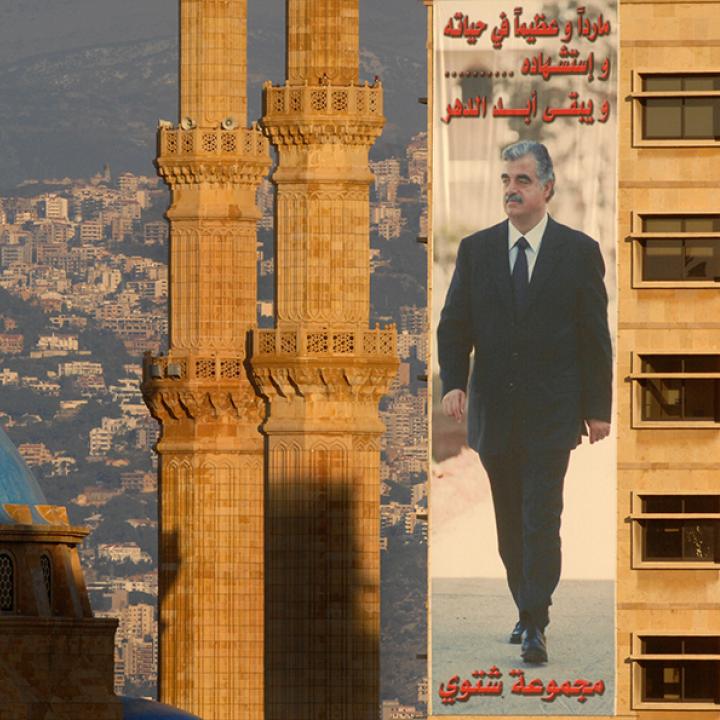

The late prime minister's assassination is only one of many destabilizing moves Hezbollah has made over the past several years.
Eight years ago today, February 14, 2005, former Lebanese prime minister Rafiq Hariri was assassinated, along with 22 others, when a massive explosive detonated as his motorcade drove past Beirut's St. George Hotel. European leaders were aghast, especially the French president, Jacques Chirac, who was particularly close to Hariri. Today, as many of those same European officials debate whether or not to designate Hezbollah as a terrorist group over its recent operations in Europe, they should take to heart the fact that over a year ago a U.N. tribunal charged four Hezbollah members with Hariri's murder, including the group's current chief operations officer, Mustapha Badreddine.
For years, European countries have pushed off the issue of adding Hezbollah to the EU's list of banned terrorist groups, citing the fact that the group had not carried out terrorist attacks on the continent since the 1980s. Sure, it raised funds across the continent hand-over-fist, and provided logistical support to operatives carrying out attacks elsewhere, but that fell below the European threshold, which is bombs exploding in Europe. Now, recent Hezbollah plots in Bulgaria and Cyprus in particular are forcing reluctant European leaders to seriously debate the issue of designating Hezbollah, in whole or just the so-called "military wing."
Perhaps the greatest reservation European leaders have about banning Hezbollah, however, has nothing to do with the group's activities on the continent but rather with concerns that blacklisting the group in Europe might further destabilize Lebanon, where Hezbollah is now one of the most dominant political parties. This is a well-founded concern, given the history of Lebanon's devastating civil war. But upon further examination, it is clear no party has played a more destabilizing role in Lebanon over the past few years than Hezbollah.
In July 2006 Hezbollah drew both Israel and Lebanon into a war neither country wanted by crossing the U.N.-demarcated border between the two countries, killing three Israeli soldiers, and kidnapping two more in an ambush. In 2008, Hezbollah took over parts of West Beirut by force of arms, and attacked the Druze community in the Chouf mountains, turning its weapons of "resistance" against fellow Lebanese citizens, several of whom were killed. Hezbollah's activities in Syria, where U.S. authorities describe the party as playing an active part in the Assad regime's "killing machine," have drawn that sectarian conflict across the border into Lebanon. Hezbollah members are accused not only of assassinating Hariri, but are also key suspects in the assassination of several Lebanese journalists, political figures and security officials, including General Wissam al-Hassan, who was killed in a massive car bombing, like Hariri, late last year.
There are plenty of reasons why, as a matter of policy, European leaders need to carefully consider the ramifications of designating all or part of Hezbollah as a terrorist group. But no one should delude themselves into thinking that preserving Lebanese security is one of them. Time and again, Hezbollah has made it clear through its own actions that its commitment to Iran and Iranian interests trumps its identity as a Lebanese political movement. From political assassinations at home, to fighting alongside the brutal Assad regime in Syria, to bombing busloads of tourists abroad, Hezbollah is anything but a force for peace and stability.
An EU designation of Hezbollah as a terrorist group is critically important, if for no other reason than the fact that it would send a clear message that the group can no longer muddy the waters between politics and terrorism. Only then, if and when Hezbollah forsakes violence for politics, can it play a stabilizing role in Lebanon or beyond.
As European leaders take a moment today to remember Rafiq Hariri, they should consider what they can do now to prevent further such atrocities in the future. High up on that list should be designating Hezbollah as a terrorist group, in the name of both European security and Lebanese security.
Matthew Levitt directs the Stein Program on Counterterrorism and Intelligence at The Washington Institute.
Weekly Standard


